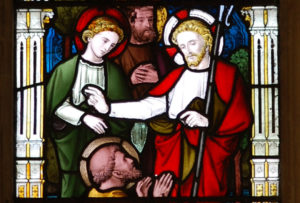Thoughts on Sunday’s Lessons for Sept. 16, 2018

Detail of a stained glass window of the Confession of Peter: “But who do you say that I am?” Church of St Mary and St Lambert in Stonham Aspal in Suffolk, England. (Click image to enlarge.)
First Reading (Track One): Proverbs 1:20-33
Have you ever noticed that ancient Hebrew poetry, like the Old Testament’s wisdom writings and the Psalms, does not rhyme words or sounds? Instead, it rhymes ideas. Look at each verse: Wisdom, as a powerful woman, is shouting out to the city and all its inhabitants: Be wise! Embrace knowledge!” Now note how every verse is divided into two lines. The idea expressed in each first line is reflected, explained, or expanded upon by the second. Ideas rhyme. Watch for this poetic technique in the Psalms, too, and see how meaning grows when lines build on lines to strengthen ideas.
First Reading (Track Two): Isaiah 50:4-9a
What is it like when great suffering lies in the road that leads to our most desired goals? We hear this challenging question in various forms in Sunday’s readings. Isaiah raises this question in his powerful metaphor of the “Suffering Servant.” What could be more important to a community than its teachers, whose words shape our growth and understanding? Isaiah portrays this teacher as a servant who suffers the humiliation of exile and turns away from those who strike him. To Israel he represented the nation awaiting vindication in its own exile. Christians would later see the image of Christ in this servant.
Psalm (Track One): Psalm 19
The heavens declare the glory of God! This psalm of praise sings out the beauty of creation, God at work in the universe. Mirroring the first reading’s exhortation to hear God’s word, its verses urge us to rejoice in our hearts about God’s perfect law, a word that, in the original Hebrew, is synonymous with “teaching.” The psalm concludes with a familiar phrase that preachers often speak at the beginning of a sermon: “Let the words of my mouth and the meditation of my heart be acceptable to you, O Lord, my rock and my redeemer.”
Psalm (Track Two): Psalm 116:1-8
In the spirit of the Suffering Servant, the poet recalls a time of sorrow when he was sick and close to death. Filled with grief, entangled in the cords of death, the Psalmist called out, and God responded. Now, rescued from death’s grip, his tears are wiped dry and his feet no longer stumble. Walking again in the land of the living, his heart fills with love for God, who has heard his voice in supplication.
Second Reading: James 3:1-12
The tongue of a teacher may reveal the way of God, but tongues can be tricky, the letter of James tells us in delightful wordplay. He likens this small but powerful organ to other little yet strong things that can control forces beyond their size: A small bridle holds back a powerful horse. A very small rudder moves a massive ship. A mere spark can flare into a forest fire. Yes, tongues may bless, but tongues can curse, too. James warns us to guard out tongues: Use them wisely, to praise and bless our brothers and sisters; don’t use them to stain the body with hurtful poison.
Gospel: Mark 8:27-38
The season after Pentecost lasts almost exactly six months this year, from June through November. We have passed the mid-point of Mark’s Gospel, and the narrative is taking a sharp turn. First, Jesus confirms Peter’s bold announcement that he is the Messiah, the apostles’ first hint of this startling revelation. Then, to Peter’s horror, Jesus tells them that he must endure great suffering, rejection and death. If they want to follow him, Jesus warns, they must deny themselves and take up the cross: You’ll have to lose your life in order to save it. What will it profit anyone to gain the whole world and forfeit their life? Soon now they will move on toward Jerusalem and the cross.
What are “Track 1” and “Track 2”?
During the long green season after Pentecost, there are two tracks (or strands) each week for Old Testament readings. Within each track, there is a Psalm chosen to accompany the particular lesson.
The Revised Common Lectionary allows us to make use of either of these tracks, but once a track has been selected, it should be followed through to the end of the Pentecost season, rather than jumping back and forth between the two strands.
For more information from LectionaryPage.net, click here.
